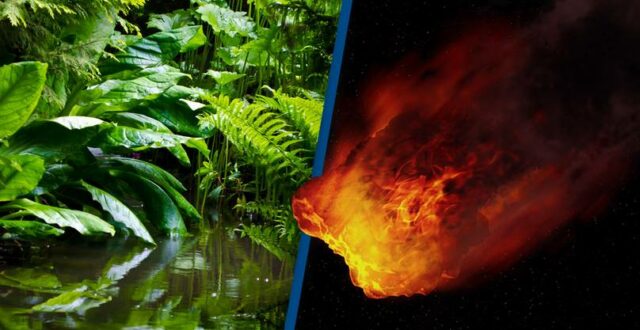It is known that the impact of an asteroid is the most probable cause for the extinction of the dinosaurs, but what happened to the plants? A study carried out in Panama, with samples taken in Colombia, points out that the event gave rise to the tropical forests that we know today on our planet.
The researchers used pollen and fossilized leaves from Colombian soil to investigate how that event changed the tropical forests of South America. After a 12 km wide space rock struck Earth 66 million years ago, the type of vegetation that made up these forests changed dramatically.
Dr. Monica Carvalho, from the Smithsonian Tropical Research Institute in Panama and co-author of the study, said: “Our team examined more than 50,000 fossil pollen records and more than 6,000 leaf fossils from before and after the impact.” The team has described their findings in the prestigious journal Science.
What findings did they make?

Scientists discovered that coniferous plants and ferns were common before the huge asteroid struck Earth in what is now the Yucatan Peninsula, Mexico at the mysterious Chicxulub crater, the site in Mexico where scientists believe the end of the dinosaurs began
But after the devastating event, plant diversity dropped by about 45% and extinctions became widespread, particularly among seed plants. The forests recovered during the next six million years, but angiosperms, or flowering plants, came to dominate those vegetation zones.
The structure of tropical forests also changed as a result of this transition
During the late Cretaceous period, when the dinosaurs were still alive, the trees that made up the forests were widely spaced. Their tops were not on each other, leaving open areas that were illuminated by the sun on the forest floor. This was the last day of the dinosaurs after the meteorite impact that killed them. But after the impact, the forests developed a dense formation that allowed much less light to reach the ground.
But how did the impact transform the sparse coniferous-rich rainforests of the age of dinosaurs into the rainforests of today, with their towering flowering trees and multi-colored orchids?
The radical change
From their analysis of the pollen and leaves, the researchers propose three different explanations:
A) The dinosaurs could have kept the forest from being dense by foraging and trampling the plants that grew in the lower areas of the forests.
B) The ashfall after the impact enriched the soils of the tropics, giving faster-growing flowering plants an advantage.
C) The particular extinction of coniferous species created an opportunity for flowering plants to take their place.
These ideas, the team says, are not mutually exclusive and all could have contributed to the outcome we see today. “The lesson learned here is that under rapid disturbances … tropical ecosystems not only recover; they are replaced, and the process takes a long time,” concludes Dr. Carvalho.

